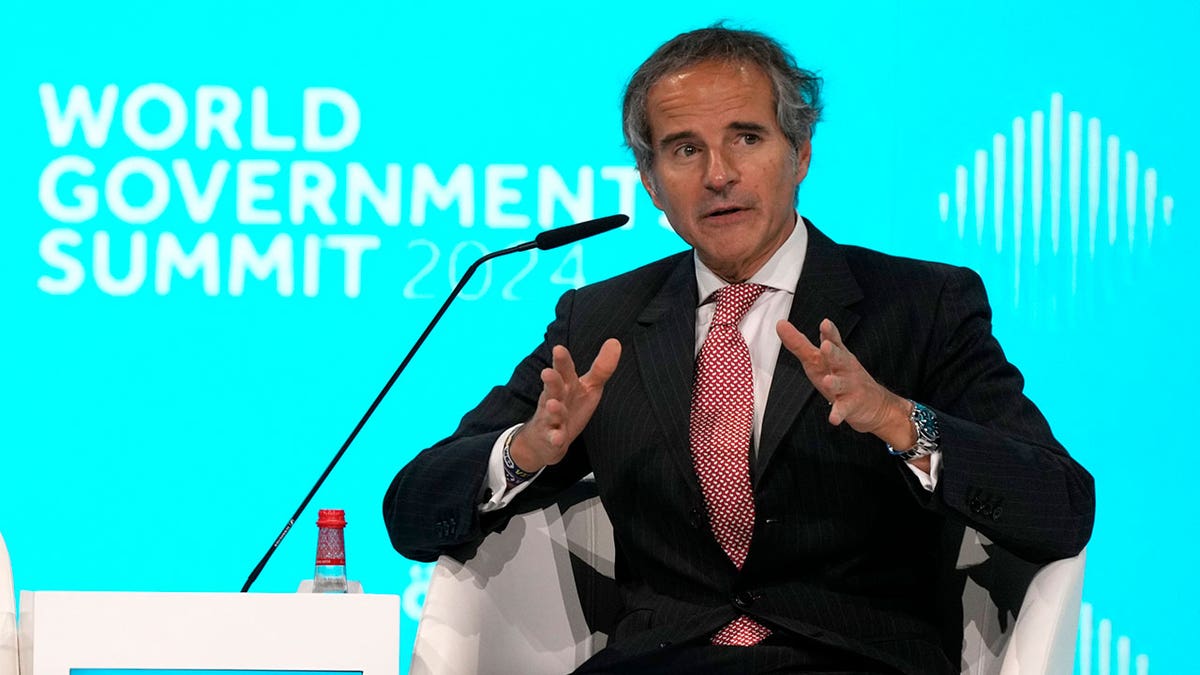US naval forces deployed to Mideast as Iranian proxies surround area
Gen. Frank McKenzie (Ret.) breaks down U.S. military efforts to deter Iran amid the Israel-Hamas war.
- Rafael Mariano Grossi, the head of the United Nations' nuclear watchdog, has warned that Iran lacks transparency regarding its atomic program.
- Ali Akbar Salehi, a former leader of Tehran's nuclear program, said that Iran possesses all the necessary components for a nuclear weapon.
- Iran has been enriching uranium close to weapons-grade levels since the collapse of the 2015 nuclear deal.
The head of the United Nations' nuclear watchdog warned Tuesday that Iran is "not entirely transparent" regarding its atomic program, particularly after an official who once led Tehran's program announced the Islamic Republic has all the pieces for a weapon "in our hands."
Speaking at the World Governments Summit in Dubai, just across the Persian Gulf, Rafael Mariano Grossi, the director-general of the International Atomic Energy Agency, alluded to remarks made this weekend by Ali Akbar Salehi. Grossi noted "an accumulation of complexities" in the wider Middle East amid Israel’s war against Hamas in the Gaza Strip.
Iran, after the collapse of its 2015 nuclear deal with world powers, has pursued nuclear enrichment just below weapons-grade levels. Tehran has accumulated enough enriched uranium to build several weapons if it chooses. However, U.S. intelligence agencies and others assess that Iran has yet to begin a weapons program. Israel long has been believed to have its own nuclear weapons program.
IRAN CAPABLE OF BUILDING NUCLEAR BOMB IN ONE WEEK, REPORT FINDS AS MIDDLE EAST TENSIONS FLARE
Iran is "presenting a face which is not entirely transparent when it comes to its nuclear activities. Of course this increases dangers," Grossi said. "There's loose talk about nuclear weapons more and more, including in Iran recently. A very high official said, in fact, we have everything, it’s disassembled. Well, please let me know what you have."

Rafael Mariano Grossi, the director-general of the International Atomic Energy Agency speaks during the World Governments Summit in Dubai, United Arab Emirates, on Feb. 13, 2024. Grossi warned that Iran is "not entirely transparent" regarding its atomic program. (AP Photo/Kamran Jebreili)
Iran, as a signatory to the Treaty on the Non-Proliferation of Nuclear Weapons, has pledged to allow the IAEA to visit its atomic sites to ensure its program is peaceful. Tehran also agreed to additional oversight from the IAEA as part of the 2015 nuclear deal.
Grossi did not identify the Iranian official who made the comment. However, in an Iranian state television show late Sunday, Salehi said that the country had all it needed to build a weapon.
"We have all the (pieces) of nuclear science and technology. Let me give an example," Salehi said. "What does a car need? It needs a chassis, it needs an engine, it needs a steering wheel, it needs a gearbox. Have you made a gearbox? I say yes. An engine? But each one is for its own purpose."
Salehi made a similar comment Saturday.
"We have it in our hands," he said then.
Since 2022, Iranian officials have spoken openly about something long denied by Tehran as it enriches uranium at its closest-ever levels to weapons-grade material: the Islamic Republic is ready to build an atomic weapon at will. That includes Kamal Kharrazi, an adviser to Iran’s Supreme Leader Ayatollah Ali Khamenei, who told Al Jazeera that Tehran has the ability to build nuclear weapons but does not intend to do so.
US IGNORES IRAN’S ACTIVE NUCLEAR WEAPONS ACTIVITIES BY USING ‘DEFECTIVE’ DEFINITION: EXPERT
Salehi's comments represent an escalation. He served as the head of the civilian Atomic Energy Organization of Iran under then-President Hassan Rouhani, a relative moderate within Iran's theocracy who reached the 2015 deal with world powers.
The hardening of Iran's position comes as militias it arms in the region — Lebanon's Hezbollah and Yemen's Houthi rebels — have launched attacks targeting Israel. The Houthis continue to attack commercial shipping in the region, sparking repeated airstrikes from the U.S. and the United Kingdom.
Meanwhile Tuesday, Iran released video of a ballistic missile being fired off the Shahid Mahdavi, a container ship transformed by Iran's paramilitary Revolutionary Guard into a floating base. The footage showed a Fateh missile fired from a launcher disguised as a shipping container, potentially meaning Iran could hide the launcher on other vessels.








































